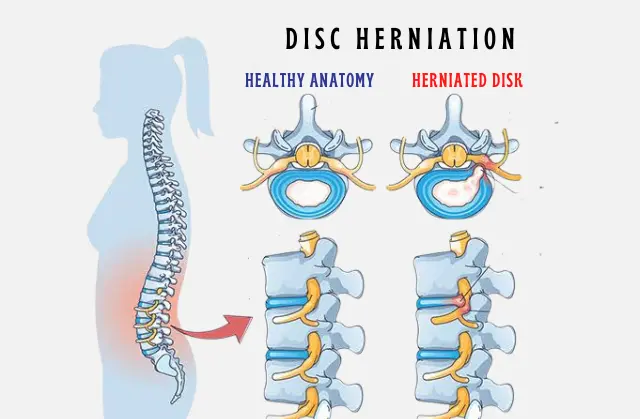Understanding Slipped Disc:
What’s a Disc?
Disc is an Jelly like structure present between the two spinal bones which acts like a shock absorber between the bones, it’s because of it, we can bend forward and bend down at neck and back

Natural Wear and Tear:
Everyone’s discs experience wear and tear over time.
What’s Slipped Disc?
Sometimes, this cushion gets injured or bulges out if wear and tear speeds up.
What Can Speed Up Wear and Tear?
Things like being overweight, bad neck and back posture, sitting slouched, lack of flexibility, smoking, growing older, injuries, Trauma and even genetics.
Where Does it Happen?
Slipped discs usually occur in the lower back or neck. While its preventable, if it happens, it follows its own path.
Signs of Slipped Disc:
Neck Slipped Disc:
Neck pain, trouble looking up, pain down the arms, shooting pain all over, weak hands, balance issues, difficulty peeing, walking strangely.
Lower Back Slipped Disc:
Lower back pain, sciatica, leg pain, foot weakness, trouble walking, numb legs, difficulty controlling pee and poop.
Other Names:
You might hear it called disc herniation, bulging disc, or prolapsed intervertebral disc (PIVD).
Who’s Affected:
Middle-aged Males often face this, but it can happen from teenage years to old age and increasing number of Women are facing this due to lifestyle changes.
What Can Be Done:
Physical therapy, injections, pain medicines, acupuncture, traction, chiropracty, ayurveda massages etc. and any other form of medicine help in relieving only the pain and give time for Self Healing. Mostly, slipped discs heal on their own by one’s own blood, about 95% of the time. In rare cases, surgery might be needed, like microscopic lumbar discectomy or fusion surgery.
How Dr. Ramachandran treats Disc related Issues:
Dr. Ramachandran understands the symptoms to the core and suggests imaging and matches them with tests. He suggests natural healing whenever possible and surgery as a last option. Surgery might be needed if leg pain lasts beyond 6 weeks, weakness or foot drop happens, or severe pain affects daily life. If surgery is needed, he advises a quick recovery procedure called Microscopic Discectomy.
In Simple Words:
Slipped discs can cause pain, but most of the time they heal themselves. If they don’t, Dr. Ramachandran knows when surgery is a good idea. He cares about getting you back to your usual activities as soon as possible, usually getting back to regular activities is on the same day.
